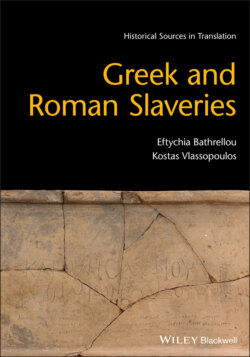Читать книгу Greek and Roman Slaveries - Eftychia Bathrellou - Страница 35
1.24 Libanius, Orations, 47.21: Greek Epideictic Oratory (Fourth Century CE)
ОглавлениеLibanius uses an analogy in order to persuade the emperor of the need to prevent tenants of agricultural land around Antioch in Syria from requesting help from people other than the owners of the land they cultivate.
Nor is it right that a slave who demands justice for wrongs he has suffered should look to someone else and present himself before someone who has no proper authority over him and beg for that man’s help, thereby bypassing his master. For he would no longer belong to his master entirely but would surrender a large share of himself – both of his goodwill and his labor – to the person who assisted him. It is indeed right that he receive justice, but he should receive it through his master. The result of a slave’s securing justice through someone else is often that the master could be deprived of his slave, becoming the object of the slave’s contempt because of the other man’s assistance.
Why should slaves ask only their masters for help?
What was the danger if they asked other people for help? How does this relate with 1.23?
What implications does this passage have for slavery as a relationship? Did it involve only masters and their slaves?
